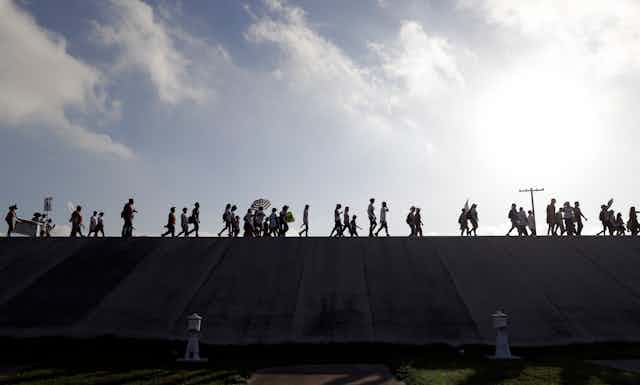Editor’s note: The following is a roundup of archival stories.
On the campaign trail, Donald Trump promised Mexico would pay for a wall along the U.S.-Mexico border.
Mexico has stated unequivocally it will not “under any circumstances.” Now, President Trump is demanding that Congress include funding for the wall in the budget lawmakers hope to pass by the end of September. Trump has threatened to shut down the government if lawmakers fail to do so.
What will it cost to build a wall?
Here are some insights from our experts.
Building walls, 101
1. Why do we build walls in the first place and what do they accomplish?
David Cook Martín, a sociologist at New York University, explains that humans have been building walls for centuries. But, he writes, they have rarely worked at solving the issues created by globalization.
“Most importantly, walling the world distracts citizens and policymakers from complex problems.”
Human and environmental impact
2. Of course, the primary purpose of this particular wall is to reduce the number of undocumented immigrants crossing the border.
However, Mexicans – the alleged culprits of Trump’s first speech on the topic – are no longer crossing in massive numbers for primarily economic reasons. Jonathan Hiskey, a political scientist at Vanderbilt University, describes how immigration from Latin America is rapidly changing. A wall would instead impact a new demographic of people who are fleeing violence and insecurity in their home countries.
3. A massive physical barrier would also impact years of cooperation on shared urban and environmental issues along the border, writes landscape architect Gabriel Diaz Montemayor at UT Austin. Instead of a wall, he offers a vision for a binational park along the Rio Grande that would benefit the environment.
“Traveling its length could become a trip comparable to hiking the Appalachian Trail, with opportunities to see recovering natural areas and wildlife and learn from two of the world’s richest cultures.”
Montemayor’s article is also available en español.
4. In fact, cross-border communities in the U.S. and Mexico – so-called “twin cities” – have shared so much in common for so long, writes UC Berkeley’s city and regional planning expert Michael Dear, that they could be described as a “third nation.”
“Unlike many people in the U.S., border residents do not equate wall-building with national security.”
Funding the wall
5. If Congress decides to fund a wall anyway, how would they do it if Mexico won’t foot the bill?
Good luck, writes Wayne Cornelius, a professor of political science and U.S.-Mexican relations at University of California, San Diego.
“One way or another, it is U.S. taxpayers who will pay for Trump’s border wall – not Mexicans. And we are unlikely to get our money’s worth.”
This is an updated version of an article originally published on April 25, 2017.

